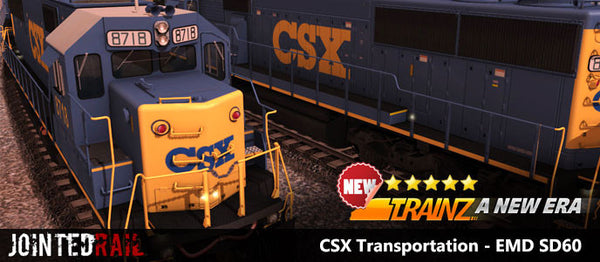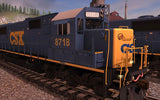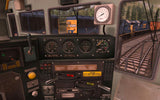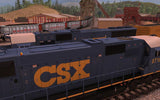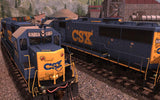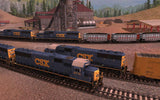In Game Downloadable Content (Requires Internet Connection)
Compatible with: TRS19 TANE SP2 and Above TANE SP1SD60 - This was the original model, and had a conventional hood unit configuration with the 40 Series (spartan) cab first employed on the SD40-2.
Features Include:
- Night Lighting
- Ditch Lights
- Auto Running Numbers
- Fan Animation
History and Development
The development of the GP50 and GP60 series (B-B) the SD50 and SD60 series (C-C) locomotives (all of these being 16 cylinders; EMD formerly offered 3,600 hp (2,700 kW) in a 20-cylinder model, the SD45, but it had a reputation for being a fuel guzzler, although the technology was identical to the concurrently available 16-cylinder models) in the late 1970s and early 1980s was spurred by the introduction of 3,600 horsepower (2,700 kW) GE B36-7 (B-B) and GE C36-7 (C-C) locomotives (both of these being 16 cylinders, as were most of its predecessors, but with major modifications to the 'power assemblies' to cope with the higher temperatures and pressures encountered at this power level in a 16-cylinder engine) by EMD's main competitor General Electric. In 1980, the SD50 model was added to the EMD Catalog. However, the SD50's electrical reliability was poor and, similarly, the 3,500 horsepower (2,600 kW) 16-645F engine had poor mechanical reliability, both believed to be largely due to excessive vibration from the 950 maximum rpm of the 645F prime mover. It was time to develop a replacement for the venerable 645 engine which, in its earlier 16-645E form, had proved to be exceptionally reliable. EMD therefore quickly commenced development of the SD60 series, which would eliminate the weaknesses of the SD50. The lessons learned in developing the 645F crankcase and crankshaft (for the earlier 20-645E, and the then-current 16-645F) were incorporated in the replacement, the 710G, first employed in the SD60. Although the carbody and frame are nearly indistinguishable from the earlier SD50, the SD60 featured the new 16-cylinder EMD 710G3A prime mover, AR-11 traction alternator, D-87 traction motors and a microprocessor-based control system that governed various electrical systems within the locomotive (e.g., wheel slip and transition).
The SD60 proved to be more reliable and fuel-efficient than the SD50, but it was not a resounding success in terms of regaining the market share that was lost due to the electrical and mechanical issues that plagued the earlier SD50. The goal was to equal or exceed the reliability of the earlier 645E-powered 3,000 horsepower (2,200 kW) SD40-2, which was an industry standard benchmark for reliability, in the new 710G-powered 3,800 horsepower (2,800 kW) SD60. This goal was largely achieved and the later 710G-powered 4,000 horsepower (3,000 kW) SD70M received what would be the largest single order for new locomotives, a 1,000 unit order from Union Pacific, (numbered UP 4000 through 4999, inclusive), which was later extended by nearly 500 additional SD70M units (numbered UP 3999 and below, and UP 5000 and above), and by nearly 1,000 additional units if UP's SD70ACe orders are included.
As an indication of its sound design, many SD60s are now being re-manufactured by their owners or by subcontractors for another 30 years of trouble-free service, 240 such units by Norfolk Southern alone, some of which will be acquired on the secondary market from locomotive lessors. These NS conversions are reported to be upgraded to include electronic fuel injection, intercooling, 'crash-worthy' fuel tanks and other components and features found in late SD70s. The traditional 'spartan' cab will also be replaced with a new 'crash-worthy' cab built to NS specifications ('Crescent cab'). Early units were completed at the original SD60's 3,800 HP rating, but all were later uprated to the SD70's 4,000 HP rating, thereby becoming for all intents and purposes the equivalent of a late SD70M, but at a fraction of an SD70M's cost.
| Platforms Supported: | PC & MAC |
| Developer: | Jointed Rail |


